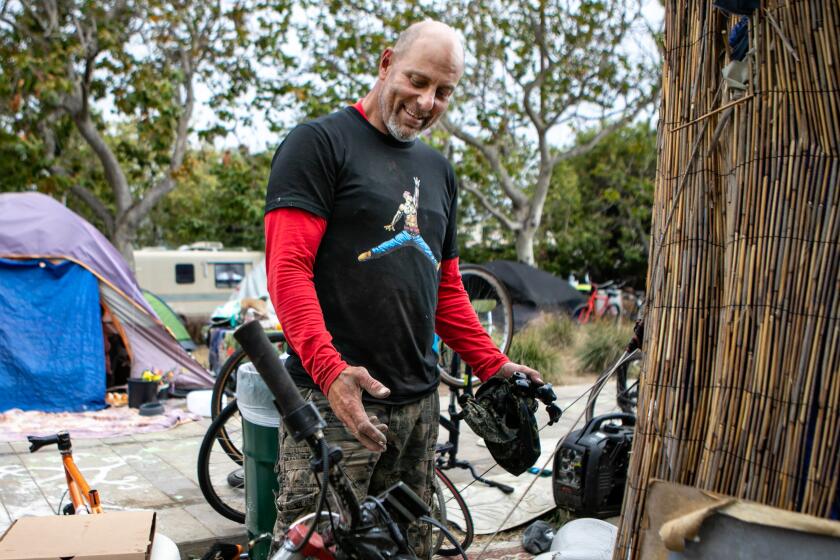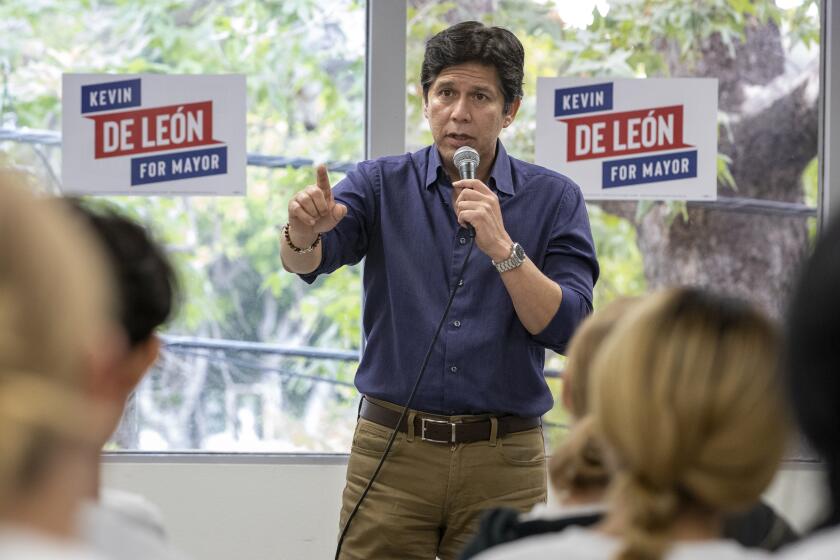Rising rents and police abolition roil an Eastside race for L.A. City Council
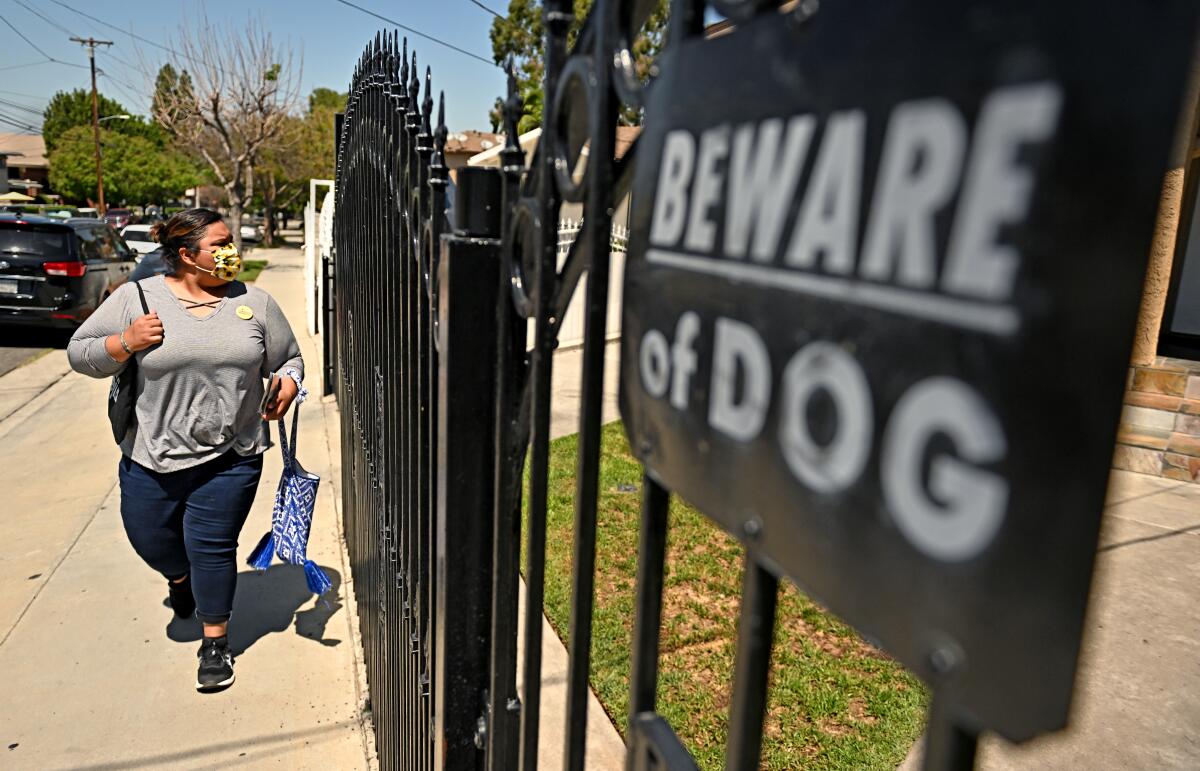
Five years ago, Los Angeles City Councilman Gil Cedillo faced a serious election scare. Despite having numerous advantages — money, endorsements, the power of incumbency — he was pushed into a runoff election by the owner of a bicycle shop.
Cedillo easily prevailed in Round 2, after his opponent’s campaign imploded over incendiary social media posts. But now, as he runs for a third and final term, the veteran lawmaker is facing an even more spirited challenge — and this time, things are a bit more evenly matched.
Community activist Eunisses Hernandez has the backing of several progressive grass-roots groups, including the local chapter of the Democratic Socialists of America. She’s raised at least $242,000 in private donations and an additional $161,000 in public matching funds, according to the most recent city records.
Councilman Mike Bonin, who represents part of the Westside, has endorsed Hernandez, saying she will bring “progressive change” to City Hall. Meanwhile, wealthy supporters outside Southern California have put money into an independent campaign committee promoting Hernandez and attacking Cedillo.
With the election a week away, the race has revolved around public safety, and calls made by Hernandez to abolish the police — a concept Cedillo opposes. But the contest has dealt even more with the rising cost of housing, and how to address it.
Hernandez has sharply criticized Cedillo’s tenure heading the council’s housing committee, saying too many in the district, which stretches from L.A.’s Eastside to the Pico-Union neighborhood, have been priced out or evicted. She put part of the blame on new development approved by Cedillo in Chinatown, Lincoln Heights and other parts of the district.
One candidate would carry on the progressive ways of retiring incumbent Mike Bonin. But most others in L.A.’s Council District 11 say they would increase policing and remove homeless encampments.
“My plan to fight gentrification is to be the biggest barrier I can to luxury and market-rate development,” Hernandez said at a recent candidate forum, drawing huge cheers.
Hernandez contends the city would be better served by helping community land trusts buy and fix up existing apartments. She also assailed Cedillo over his ties to real estate interests, which have spent more than $600,000 on an independent campaign supporting him and attacking her.
Cedillo, in turn, accused Hernandez of demonizing the housing industry, which he described as crucial to solving the region’s affordability crisis. He said he is pushing for city agencies to acquire apartment buildings in Chinatown and Westlake. And he argued that L.A. has some of the strongest protections for renters in the nation.
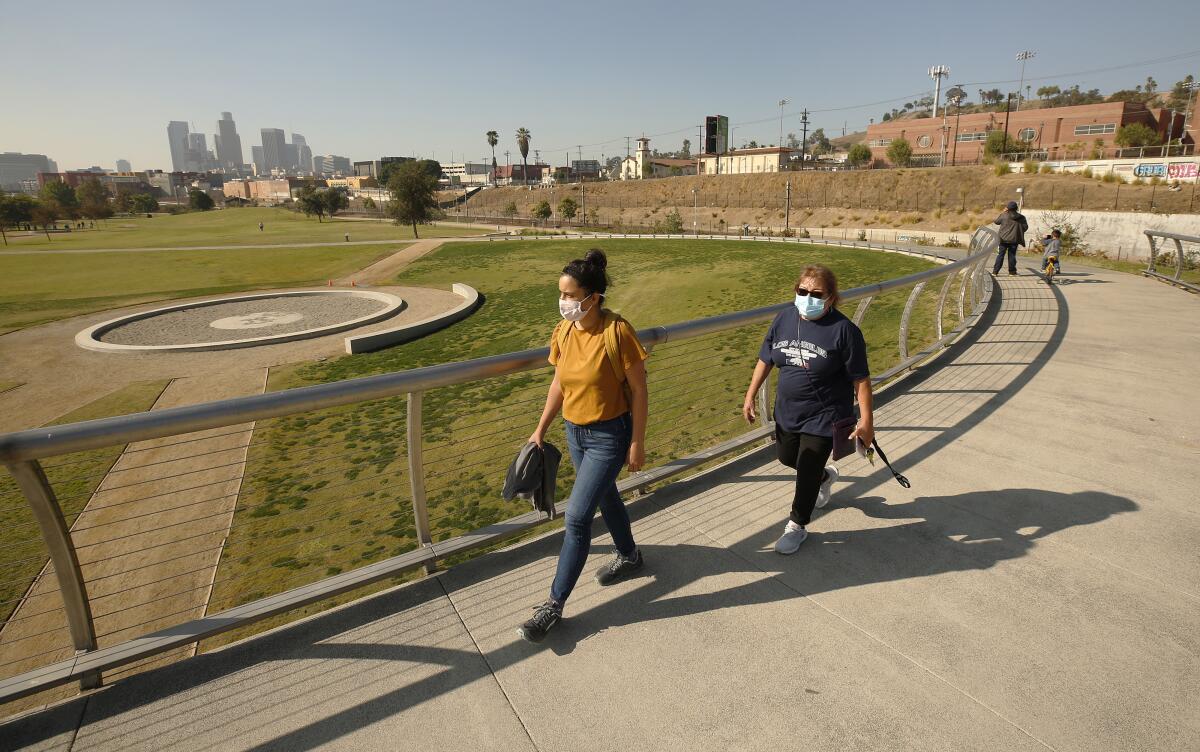
In an interview, Cedillo pointed to a city report that showed his council district produced the most affordable housing in L.A. between 2009 and 2020. City leaders have a moral obligation, he said, to approve all kinds of housing — low-income apartments, luxury high-rises, modest cottages tucked into backyards — to increase supply and bring down prices.
“The only people who are going to build housing are people involved in the industry, so why would we vilify that community?” he asked. The criticism “seems rather odd from someone whose ... political career is funded by billionaires.”
That last remark is a swipe at political spending by at least two of Hernandez’s backers: Patty Quillin, spouse of Netflix Chief Executive Reed Hastings, and philanthropist Elizabeth Simons, daughter of a hedge fund billionaire — who have put at least $85,000 into a campaign committee promoting Hernandez and criticizing Cedillo.
Get the lowdown on L.A. politics
Sign up for our L.A. City Hall newsletter to get weekly insights, scoops and analysis.
You may occasionally receive promotional content from the Los Angeles Times.
Quillin is based in Santa Cruz, while Simons is in the wealthy community of Atherton, according to donation reports.
Cedillo criticized Hernandez for calling for the abolition of police, saying officers are urgently needed to respond to homicides, rapes and follow-home robberies. The district’s low-income residents will be the ones who suffer from such policies, not Hernandez’s affluent benefactors, he said.
“Ms. Hernandez’s abolitionist position is dangerous and detached from reality,” Cedillo said.
Neither Quillin nor Simons responded to inquiries from The Times. Hernandez said her support from those philanthropists shouldn’t be a surprise, given her extensive history of nonprofit work.
Hernandez is a co-founder of La Defensa, an advocacy group that focuses on electing progressive judges and creating alternatives to criminalization and incarceration. She has long argued that public dollars should be moved out of law enforcement and into addiction treatment, mental health services and stable housing options.
In an interview, Hernandez said most people are in county jails because of issues stemming from poverty, drugs and poor mental health. The region’s elected officials first need to address the power that law enforcement has to “drive people into incarceration and criminalization,” she said.
“Then we can refocus back on this question of, should they be handling murders and crime,” she said. “Because right now they’re handling too much, and all that’s happening is that Black, brown, Indigenous and low-income communities are getting incarcerated and getting saddled with the collateral consequences of that incarceration.”
Cedillo and Hernandez are vying to represent a district that stretches from Lincoln Heights to the edge of South L.A., snaking through Mount Washington, Cypress Park, Westlake and other areas. Although the population is nearly two-thirds Latino, some parts of the district have seen the arrival of wealthier, white residents.
Hernandez, 32, is looking to replicate the success of Nithya Raman, who unseated Councilman David Ryu two years ago. She has hired several staffers from Raman’s 2020 campaign, including Meghan Choi, who served at one point as Raman’s chief of staff at City Hall.
If Cedillo falls short of 50%, he almost certainly won’t get a do-over, as he did with the runoff election in 2017. The only way that could happen is if the district’s lone write-in candidate, Elaine Alaniz, wins a meaningful share of votes, denying the others a majority.
As a result, Cedillo has spent much of the campaign highlighting his own list of progressive endorsers, a group that includes Sen. Bernie Sanders (I-Vt.), county Supervisor Hilda Solis and the Los Angeles County Federation of Labor, AFL-CIO.
Cedillo, 68, is also emphasizing his work at City Hall helping Angelenos weather COVID-19.
Early in the pandemic, Cedillo and his colleagues passed a measure barring landlords from hiking rents in older apartment buildings, which won’t expire until July 2023 at the earliest. The council temporarily barred evictions in cases where a tenant’s inability to pay was caused by COVID-19, a measure that also won’t expire for more than a year. City agencies provided more than $100 million in rent relief and nearly $34 million to help Angelenos pay their utility bills.
“We served over 160,000 hot meals in our district,” he said. “We turned into FEMA overnight.”
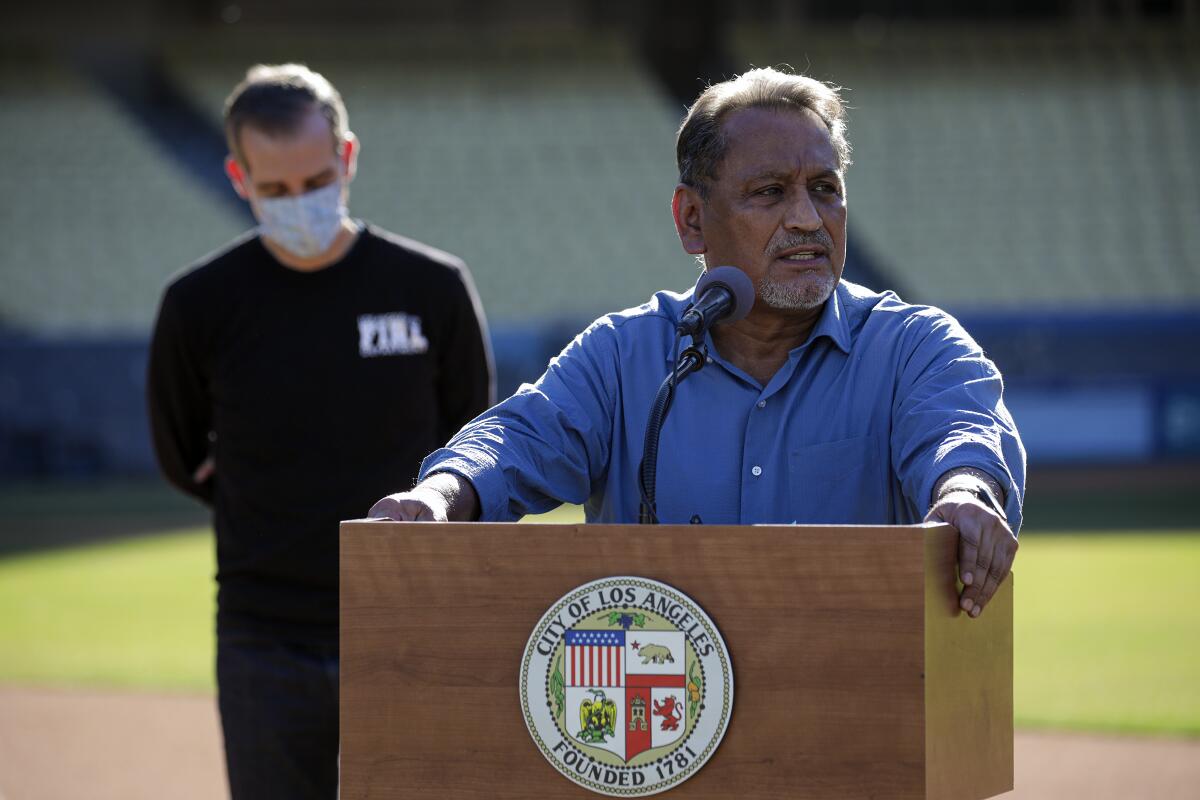
Cedillo, who grew up in Boyle Heights, is a former labor organizer best known for his work in Sacramento advocating for the state’s immigrants who are in the U.S. illegally to become eligible for driver’s licenses.
Hernandez, a lifelong resident of Highland Park, is best known for her work at La Defensa, where she served two years as executive director and was co-author of Measure J. That measure, approved by voters in 2020, prompted county officials to put $100 million into community services, such as youth programs and job training.
La Defensa also pressed county leaders to move forward with plans for closing Men’s Central Jail and replacing it with social services.
Kevin de León’s Latino support has been lukewarm so far in the Los Angeles mayor’s race.
Those efforts have impressed Virginia Espino, a lecturer at UCLA who lives in Mount Washington. Espino likes that Hernandez is focused on criminal justice programs that deliver care, not incarceration.
“I grew up with a lot of young men who wound up in jail and in prison, and their life ended nowhere,” she said. “I don’t want to see that for the future generations.”
On the campaign trail, Hernandez has promised to oppose the hiring of more Los Angeles Police Department officers, even to replace those who retire. And she criticized Cedillo for adding police patrols to the Figueroa Street business district, saying teams of psychiatric clinicians should be sent out instead.
Hernandez’s approach to public safety worries some of Cedillo’s constituents.
Delia Ibarra, an attorney who lives in the Angeleno Heights section of the district, said she knows Cedillo is “not perfect.” But she’s concerned about calls to abolish the LAPD.
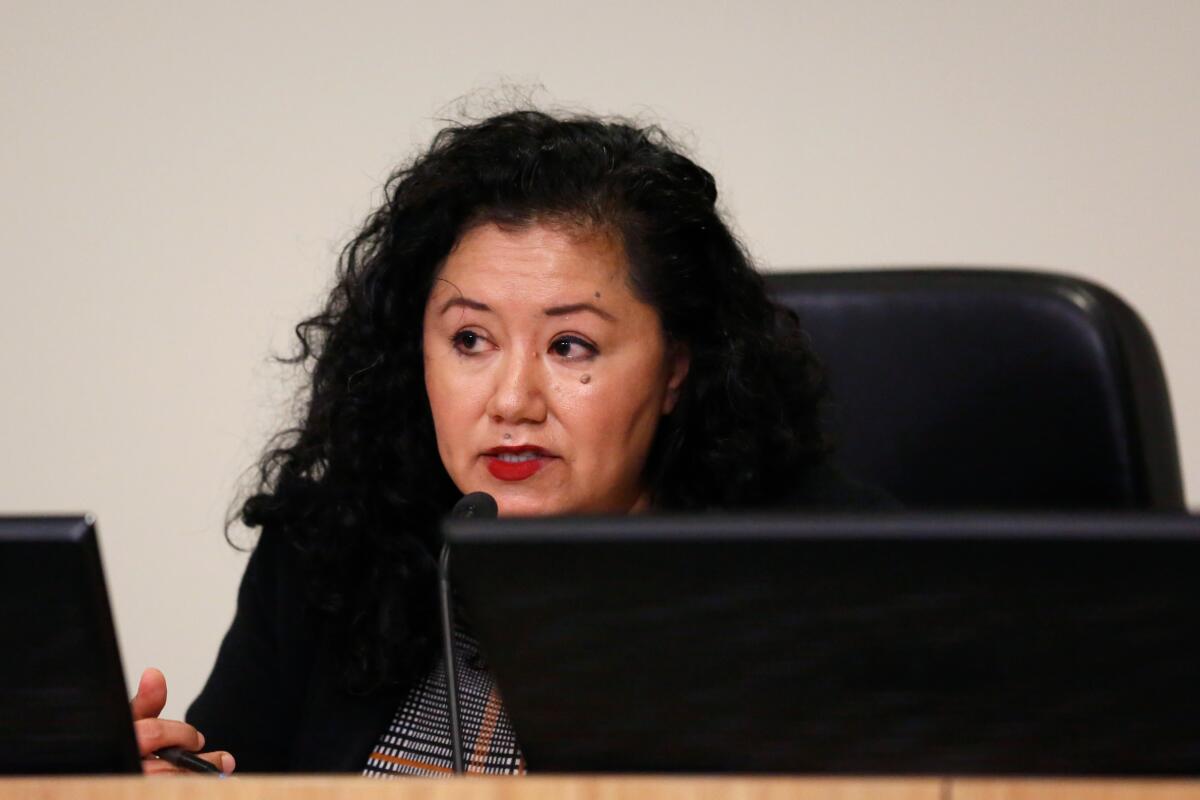
District residents don’t want to be harassed or profiled by police, said Ibarra, who serves on the city’s Board of Fire Commissioners. They do want officers who will respond effectively in an emergency, she said.
“We all want a society where police aren’t necessary,” she said. “But police are necessary.”
The California Apartment Assn., whose campaign committee has spent more than $600,000 on efforts to reelect Cedillo, seized on the crime issue, warning voters that Hernandez wants to eliminate the LAPD.
Hernandez and her allies have responded with campaign messages that portray Cedillo as a tool of real estate interests, accusing him of fast-tracking luxury development and slow-walking renter protections.
If Cedillo isn’t replaced, Hernandez said, “many of my community members are not going to last another four years.”
More to Read
Sign up for Essential California
The most important California stories and recommendations in your inbox every morning.
You may occasionally receive promotional content from the Los Angeles Times.
